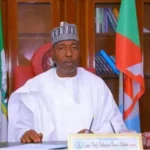The United Nations Children’s Fund (UNICEF), on Monday, called for the immediate and unconditional release of 150 students abducted at an Islamic school in Niger State recently.
In a statement on Monday, it expressed concerns over the fate of the children whisked away by their abductors at Salihu Tanko Islamic School, Tegina, Rafi Local Government of Niger State two weeks ago.
UNICEF expressed concerns about the fate of the children some of whom are as young as three years old and called for their immediate and unconditional release.
“As Nigeria just marked two weeks since the abduction of 150 students from the Salihu Tanko Islamiya School in Tegina, Rafi Local Government Area of Niger State, north-central Nigeria, we are appalled that two weeks after 150 students were abducted from their school, they continue to be held by their abductors,” said Rushnan Murtaza, Officer in Charge, Representative of UNICEF Nigeria.
“Parents are grieving their children’s ‘disappearance’; siblings are missing their brothers and sisters – these children must be immediately and unconditionally released and safely reunited with their families.
“It is horrifying that schools and schoolchildren continue to be targets of attack – and in this particular incident, even children as young as three years old.
“We can only begin to imagine how frightened they are, and the impact this will have on their mental health and well-being.”
UNICEF stressed that attacks on students and schools were not only reprehensible but a gross violation of the right of children to an education.
The organisation called on the Nigerian government to take all measures to protect schools in the country, and implement the promises made in the Financing Safe Schools in Nigeria Conference in April this year so that children will not be fearful of going to school, and parents afraid of sending their children to school.
“Schools must be safe places to study and develop, and learning should not be a risky endeavour,” said Rushnan Murtaza. “There are very few – if any – things more important for any society than ensuring the safe education of its children.”

 Join Daily Trust WhatsApp Community For Quick Access To News and Happenings Around You.
Join Daily Trust WhatsApp Community For Quick Access To News and Happenings Around You.

